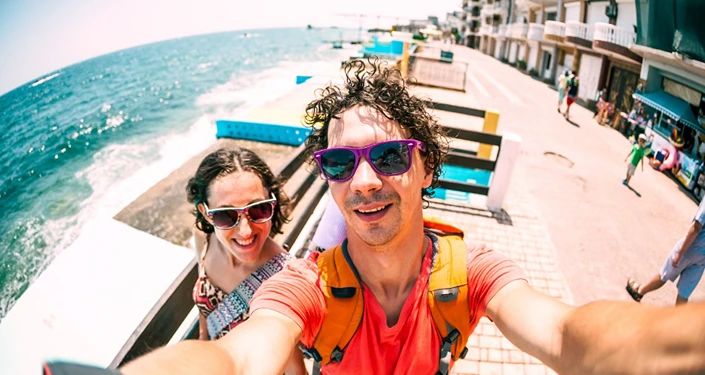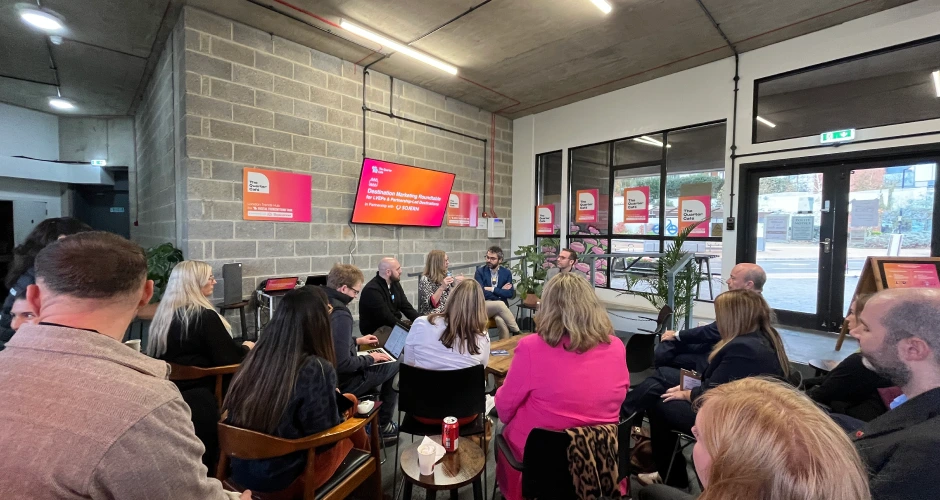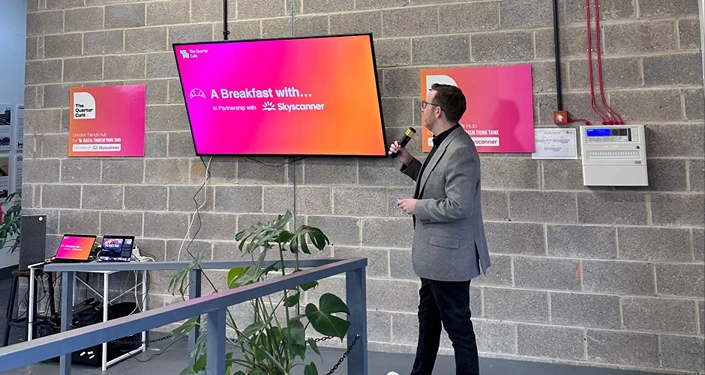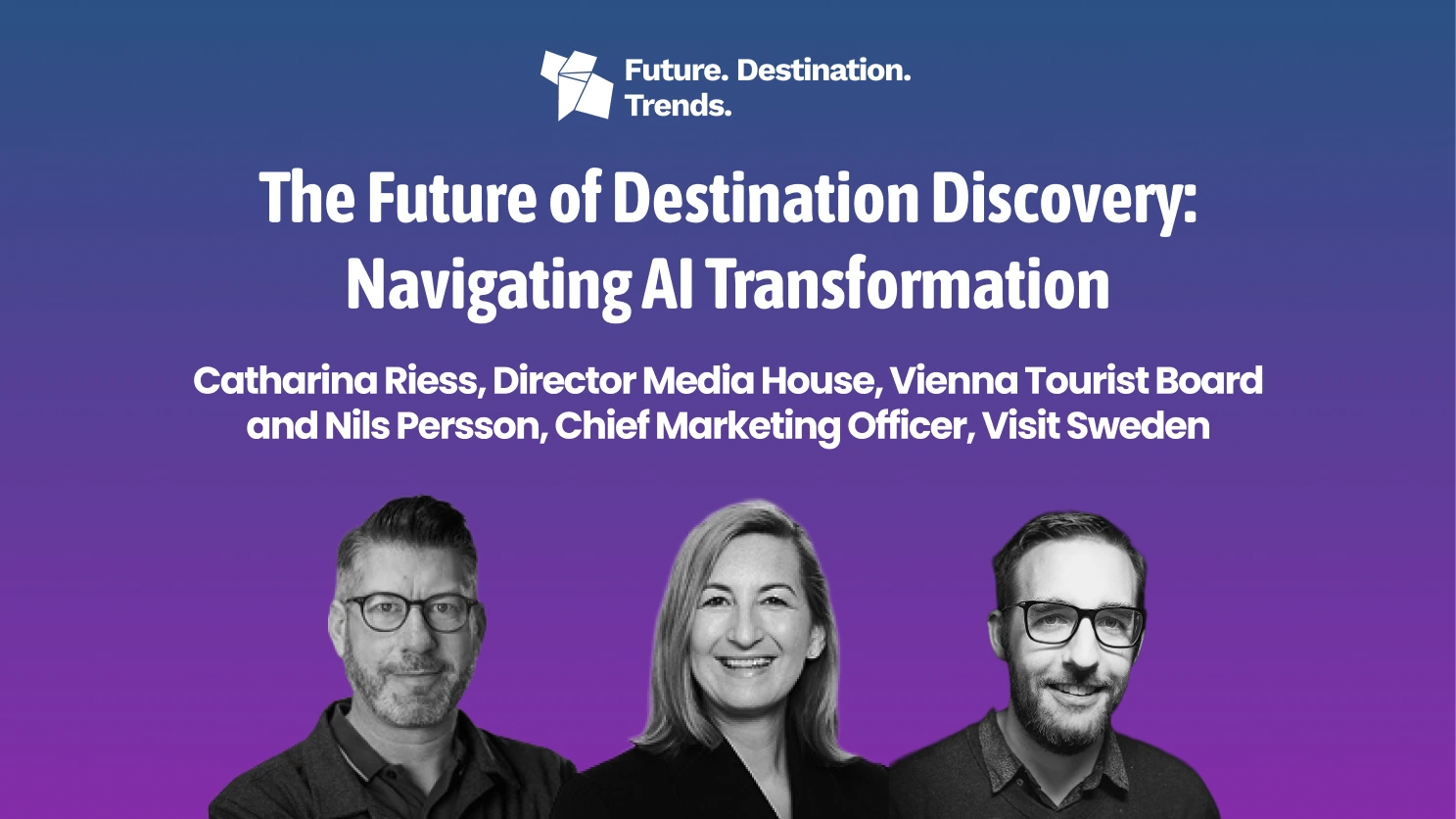In our Backstage Leadership Conversations podcast series, in collaboration with Abu Dhabi's Culture and Tourism Department, we explore the post-pandemic trends in business travel, focusing on key areas such as technology, impact, sustainability and recovery. Learn how Abu Dhabi is helping the MICE sector to thrive.
For this series, we went backstage at Abu Dhabi Business Events Week and had engaging discussions with a range of interesting leaders from across the sector to understand more about the shifts and trends they have witnessed in their work. We heard a range of different perspectives and talked about how everybody can collectively come together to reinforce Abu Dhabi's very competitive positioning and continue to help the MICE sector thrive as a more competitive, exciting and innovative industry as we come out of the pandemic.
Nick Hall
In the eighth and final episode, we dive into how we can further the competitiveness of the MICE sector with Paul Rulkens, the High-Performance Mastermind. As an international professional speaker, he helps organisations turn their big ideas into huge actions. His expertise is high performance - the ability to consistently achieve big goals with less effort, focusing on building high-performance teams, driving innovation and accelerating executive power.
Acknowledging Paul's wealth of expertise for over 20 years, during which he's advised, supported and provided thought leadership to many all over the world. I started the conversation by focusing on Abu Dhabi's Department of Culture and Tourism and their goal to become one of the leading meetings and events destinations worldwide, and how this can be achieved. This is a key question that we wanted to answer as it will be a journey that requires a transition and huge investment in both product and people's capabilities as well as the overall mindset we adopt as an industry.
Paul Rulkens
If you typically look at ambitious goals, and I love thinking big. You need to realise that 70% of all strategic initiatives fail to achieve their talent goals. Those are the odds. The question is what can you do to improve those odds? Typically, if you want to improve those odds, there are three areas you need to focus on.
Firstly, you need clarity and be very clear about what you want to achieve. The second area is you need to maintain focus. There are a million ways of achieving your goal, but only a few of them will give you energy and will connect to your strengths. Therefore, focus is very important. The third leg is execution and getting it done. What is your system or process to every day make steps towards your goals? If you focus on clarity, focus and execution, those are the three building blocks which prevent your strategy from failing.
Nick Hall
After hearing about those keys laid out by Paul, having a better understanding of what the consequences are if any of those components are missing and how it might inadvertently create a disjointed approach that prevents the destination from achieving its bigger goal is a really key thing to understand. Here's how Paul sees this.
Paul Rulkens
Typically what happens, for example, if you lack clarity, you'll find organisations which are running very hard, but they haven't set a direction and are all over the place. They are very busy, but have little achievement. Organisations which are unable to focus, try to do everything at once. So, instead of a spear tip, you have some kind of broad tsunami and nothing gets done. Finally, organisations which are unable to execute stay in the brainstorming phase in the idea generation phase, but they have trouble testing new ideas and helping to put action into practice to achieve some tangible goals. Consequently, you need all three components: clarity, focus and execution.
Nick Hall
Being aware of the fail rate mentioned by Paul, it's also important to consider the three elements that he mentions and how even for very ambitiously driven businesses, missing one of those components can lead to their downfall. Moving from this discussion point, I asked him about values. These are becoming increasingly relevant in today's world, which is why I wanted to get his opinion on how destinations can incorporate values across those three pillars while creating differentiation.
Paul Rulkens
I look at value from two perspectives. First of all, it is about value creation. The second perspective is to value the way you do things. These are the behaviours. Touching upon both elements, firstly, the mindset if you talk about high performance and what has got you here will no longer get you there. If you want to have results you've never had before, you need to start doing things you've never done before.
The second idea is that you don't have to be sick in order to get better. If you talk about value creation, it is not about trying to compensate weaknesses, but it is about building on strengths. It is very important for destinations to consider their strengths and how to become 10 times stronger at the stuff they are already very strong at, instead of trying to compensate for all kinds of weaknesses. There is a very important thing if you talk about mindsets, values and value creation about building on strengths and taking them to the next step.
The third element is that you will never get the new results that you want from the existing behaviours that you like. The results that you have are the outcome of the behaviours that you show consistently. If you want to achieve different goals, apply a different strategy. The question is, which type of behaviours do I need to build in order to create value? For example, one behaviour is, am I playing to win or am I playing not to lose? What you typically see is that organisations which are playing to win, do very different things than organisations who play not to lose, who are defensive and try to keep what they already have. These mindsets and behaviours are essential if you want to create value and take the next step in strategy and strategy execution.
Nick Hall
I thought this point was almost an oxymoron. On the one hand, we need to build enough on current strengths to become stronger, without looking for pockets in which we are weak, in order to reinforce and maintain our position as leading actors. On the other hand, we need to apply the same principles to the mindset aspect in order to bridge existing gaps and keep fresh thinking about opportunities on the horizon.
Paul Rulkens
I think there's an excellent point about mindset. If you talk about building on strength, it's about focusing on behaviours which will drive value. The other side is to get rid of the behaviours which mask your strength as a leader or an individual. For example, one of the behaviours I often see in leaders, even very successful ones is the behaviour of listening to reply instead of listening to understand. If the leader listens to understand he has got a very different mindset and outcome than leaders who listen to reply. For those behaviours which mask your strength, look at your organisation and leadership to see what you can do to change those behaviours in order to flourish and build on your strengths as well as get an interesting perspective from a high-performance point of view.
Nick Hall
I thought this was a very interesting capability and something that can truly strengthen the leadership approach of an executive team by having that sense of humility and the ability to reflect and consider everything, to which Paul added the following.
Paul Rulkens
This is about the second phase of leadership. It's about developing others and developing your organisation. If as an organisation you want to improve the outside world, the first step is to improve your inside world. The way you do things internally is also the way you do things externally. For example, from a destination point of view, one of the keys for destination growth is to fall in love with your customer instead of falling in love with your product, processes or system. That distinction is very important.
If you want to get better at falling in love with your client, the trick is to improve internally on that behaviour. Ask yourself as a leader, where are you internally in love with your processes, while in reality, you should be in love with your clients. This will help not only to improve internally, but especially externally to achieve your strategic goals.
Nick Hall
Following Paul's insights, I thought he presented a key learning that many will be able to take on board to think about how we can create a true sense of passion and connection with what we do so that we can relay that naturally to our customers in an outward-facing way. We moved the discussion onto looking at the MICE sector, which in 2022 was valued at $1.2 billion globally, which demonstrates its huge size and that the sector is recovering well. Nonetheless, this also means that in today's world, we need to be sharper in how we seize opportunities and craft our position within them.
The opportunity and size of the market are considerable, but simultaneously competitiveness and cutting through represent real challenges. In the case of Abu Dhabi, we can see that the destination has adopted a huge sense of ambition and vision, which are paired with very significant investments and projects that sit behind these. I asked Paul how in such a situation, we can help to see where the competitive edge might exist and how that can be built up alongside this huge ambition and the notable investments which have already taken place.
Paul Rulkens
The keys to high-performance organisations are also very applicable to the destination industry. The key to high-performance is strategic quitting. Your ability to strategically quit equals your ability to massively succeed. This means taking the next step. It's not about more and better and faster projects, instead, it's about taking out everything which no longer supports your ambition and masks your strength.
Applying strategic quitting is one of the key elements that leaders in high-performance organisations do consistently. They look at their entire organisation and they say, if we want to achieve this strategy and these goals, what is it that we need to strategically quit first in order to release the time, energy, money and resources to do different things? It is a bit counterintuitive because often what you see is that ambitious organisations have a big plan. These are the 100 projects we are going to do.
Key Takeaways
To achieve desired results, it is essential to push the boundaries and explore new frontiers that may be unfamiliar to your organisation. In terms of value creation, the focus should be on leveraging strengths rather than compensating for weaknesses as a means of improvement.
The emphasis on building strength lies in prioritising behaviours that drive value. By improving internally, an organisation can lay the foundation for enhancing the outside world.
Here are some additional takeaways:
- Values: Be clear about your values and use them to guide your decisions. This will help you create a unique and differentiated offering for your destination.
- Clarity, focus, and execution: Have a clear understanding of your goals, focus your resources on those goals, and execute your plans effectively. This will increase your chances of success.
- Strategic quitting: Don't be afraid to let go of things that are no longer working or that are not aligned with your goals. This will free up resources and time to focus on the things that will make the biggest impact.
For an organisation to become more competitive, it must concentrate on its specific goals and build value.






.svg)





.webp)










.webp)
